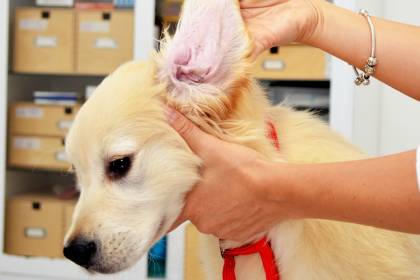Some human medications are safe for dogs, while others are toxic. When it comes to Xanax, this is a medicine that is used by both dogs and their pet parents. Xanax (its generic name is Alprazolam) is sometimes used to treat moderate to severe anxiety in dogs. For instance, the medication is sometimes prescribed for dogs who are afraid of thunderstorms.
Connect with a verified veterinarian in minutes. Licensed vets are available 24/7 to answer your questions. No need to worry about your furry family member.
What is Xanax?
Xanax is a benzodiazepine, which is a class of sedatives. It has a calming effect on the central nervous system. This is a safe medication when taken at the right dose; however, too much of the substance can lead to toxicity in humans or dogs.
It can happen that your dog may have gotten into your medicines, or he may have somehow gained access to his own meds. In either case, it’s very easy to overdose, especially if he took your dose of the medication. This can be a life-threatening emergency.
Symptoms of Xanax Toxicity in Dogs
Signs and symptoms that may indicate a Xanax overdose in your canine companion can include:
- Severe sedation (extreme sleepiness, not easily aroused when asleep, etc.)
- Incoordination
- Nausea
- Agitation
- Vomiting
- Hypothermia
- Hyperthermia
- Respiratory depression (not breathing as often or as deep as normal)
- Cardiac depression (heart rate becomes extremely slowed)
If you dog shows any of these signs and symptoms, he’s having a medical emergency and it’s time to call the vet immediately.

Review symptoms, medications & behavior to keep your pets healthy with a Vet Online in just minutes.
Ask a Vet Live NowTreatment of Xanax Toxicity in Dogs
Do not induce vomiting, unless instructed to do so by your vet. This can be dangerous, especially if your dog is not easily awakened. If he began to vomit, he could inhale the vomit directly into his lungs, leading to more complicated and dangerous health issues such as pneumonia.
Be sure to let the vet know about what time your dog may have swallowed the Xanax, and approximately how much your fur baby ingested. The vet will then do a physical exam and will order blood tests and a urinalysis. These will show if your dog is having a toxic reaction to the medication.
If your dog isn’t having a life-threatening reaction, then the vet may allow you to treat your fur baby at home. The vet will give you instructions on how to support your dog as he recovers.
On the other hand, if your fur baby has been severely poisoned, he will likely need to remain in the hospital for a few days. Treatment may involve hydrating your fur baby to flush the medicine out of his system. If your dog is too hot (hyperthermia) or cold (hypothermia), then he will be warmed or cooled as needed, so his temperature will get back to normal.
Medications may be used to treat diarrhea, vomiting, and breathing difficulties. He may also require supplemental oxygen to make sure his oxygen level is normal. Other treatments will be given as determined by the vet.
Your fur baby has a great prognosis with fast diagnosis and treatment. We wish you both very well!
FAQS
1. Can Xanax Cause a Different Effect in Some Dogs?
Yes, it is possible for Xanax to cause the opposite effect in some dogs. The medication is most commonly prescribed to treat anxiety in dogs. While this medication has a calming effect on most dogs, it can cause some dogs to become hyperactive, agitated, or have other unusual behaviors.
So, if your dog has eaten your Xanax, it is possible that rather than being sedated he will be hyperactive or show other behaviors that are not normal for him. Even so, it’s imperative to call the vet if your dog has eaten your medication.
2. How Long Does Xanax Last in Dogs?
There’s no clear answer, as this can vary between dogs for these reasons:
- It can depend on how much medication the dog has ingested
- The dog’s physiology and metabolism
- How the medication affects the dog—some dogs will be sedated, while others may become hyperactive.
3. Is There Any Difference Between Canine and Human Xanax?
Yes, there are some differences in the formulations of the medication for humans and canines. The active ingredient is the same; however, the dose, dosage form, and inactive ingredients can be different.
Human Xanax is specifically formulated for humans and should not be given to dogs (unless the vet instructs you to do this). Always consult your vet before giving your fur baby any human medication, including Xanax.
4. Are There Risk Factors for Canine Xanax?
Dogs who are allergic to the active ingredient in Xanax should not take this medication. The medication should be used with caution in dogs who are debilitated, elderly, pregnant, lactating, or in dogs who have liver or kidney disease or glaucoma.
Connect with a verified veterinarian in minutes. Licensed vets are available 24/7 to answer your questions. No need to worry about your furry family member.

Kyoko
Kyoko is from a family of 3 and moved to New York with her parents and siblings when she was 13. Kyoko is fond of spending a great amount of time with pets, specifically her beagle Luna and cat Missy. Her boyfriend often complains that she spends too much time giving attention to their animals. Kyoko has written dozens of articles concerning pets and is aiming at owning a pet shop one day!
Review symptoms, medications & behavior to keep your pets healthy with a Vet Online in just minutes.
Ask a Vet Live Now




